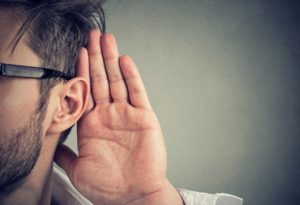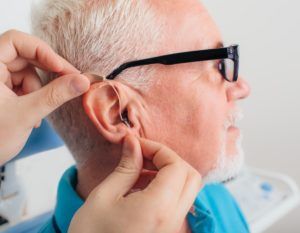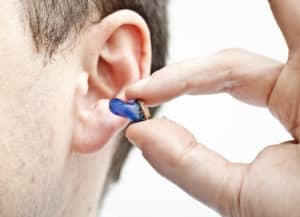Hearing Instruments in Austin, TX
Effects of hearing loss

Studies have shown that untreated hearing loss can affect your overall health. Hearing loss can be indicative of a larger health issue. Many diseases can produce hearing loss. Inner ear viral inflammation, autoimmune diseases, cardiovascular disease, diabetes, and brain tumors are just a few examples. Left undiagnosed these conditions can worsen over time.
A person’s job performance, income potential, and the ability to learn in a changing work environment are all issues common with hearing loss. Co-worker’s perception of the person with hearing loss can suffer as they mistake hearing loss for a lack of ability or knowledge.
Communication is critical to social interaction. Studies have shown that people with hearing loss can become socially withdrawn and depressed.
- Indicative of more serious health problems
- Difficulty maintaining a job
- Trouble communicating effectively
What is a Hearing Instrument?
 A hearing instrument is a device that can be worn within or behind the ear to improve hearing. This device allows people with some degree of hearing loss to be more engaged and in tune with their surrounding environment.
A hearing instrument is a device that can be worn within or behind the ear to improve hearing. This device allows people with some degree of hearing loss to be more engaged and in tune with their surrounding environment.
A hearing instrument comes in five levels of sophistication. There are Premium, Mid-Level, Entry-Level, Basic, and Essential technologies available at different cost levels. Enhanced digital, programmable, self-regulating hearing instruments with Bluetooth connection, smartphone control, and direct iPhone connection are an example of the technology that is now available.
The right level of technology and cosmetic aspects are something that is personal as well as related to your type of hearing loss and eardrum issue. The detailed evaluation by Dr. Slaughter and William J. Boggess, M.S. in our office, is necessary to inform you of all of your options.
Hearing instrument Patient Testimonial

“I went to Mr. Boggess a couple times for my hearing testing as well as fitting a new hearing aid. He appeared very knowledgeable and was thorough in his work. He was very courteous and never pressured me to buy from him. He was so good I didn’t mind traveling from Houston to Austin to see him. I am glad I found this wonderful audiologist. ”
-Prabodh M.
Benefits of Hearing instruments
Besides having improved hearing, one of the benefits many patients notice is the improved ability to communicate with their loved ones. This enhancement in understanding allows for an improvement in personal relationships. Since it will allow you to be part of the conversation, you will no longer have a tendency to withdraw from social situations.
In addition, hearing instruments can reduce frustration with yourself and others. You will no longer have to ask people to repeat themselves or need the volume of the TV turned up, allowing you to feel more comfortable in your personal life.
- Improved relationships
- Better quality of life
- Less stress in social situations
Who is a candidate for a hearing Instrument?
Patients who have hearing loss can have difficulty communicating with friends, family, and coworkers. They can benefit from modern hearing instruments, even if the amount of loss is mild. If you or your family have felt frustration at your lack of understanding, it is worth having a thorough evaluation of your ears and hearing to see the cause and options.
The right level of technology and cosmetic aspects are something that is personal as well as related to your type of hearing loss and eardrum issue. The detailed evaluation by Dr. Slaughter and William J. Boggess, M.S. in our office, is necessary to inform you of all of your options.
How Do Hearing Instruments Work?
What Is The Typical Hearing Instrument Selection Process?
The hearing instrument selection process begins with a comprehensive hearing test. After the results are analyzed by our audiologist, a dedicated hearing instrument evaluation is scheduled. During this visit, you can explain what improvements you want from your hearing instrument, your personal lifestyle, and your budget. Once the perfect hearing instrument is identified, you can try the hearing aids for one week in your daily life to ensure the instruments are a good fit. We also offer a 30-day trial after purchasing the hearing instruments. After purchasing a hearing instrument from Sinus & Snoring Specialists, we will be available for hearing instrument adjustments and also to answer your questions along the way.

Read Blog Post: OTC HEARING AIDS VS. PRESCRIPTION HEARING AIDS
Different Types of Hearing Instruments
Hearing instruments can be styled and worn in three ways: in the ear, in the ear canal, and behind the ear.
- In The Ear: The hearing instrument is placed in the “conchal bowl”, the indentation in our ear that surrounds the ear canal.
- In The Canal: The hearing instrument fits cozily in the ear canal. The instrument is customized to fit the size and shape of the ear canal.
- Behind The Ear: This is the most common style of hearing instrument. A hearing instrument is placed behind the ear. The hearing instrument is connected to a small clear tube that sits in the ear canal to deliver the amplified sound waves. These devices are very popular as the separation of the hearing instrument from the amplified sound waves provides a superior and clearer sound with less feedback.
Hearing instruments can also be either analog or digital.
Digital Hearing instruments
These instruments convert sound waves into a digital code that is amplified into sound waves. This creates a superior, cleaner, and more natural sound.
Analog Hearing instruments
These hearing instruments convert sound waves into electrical signals that are then amplified into sound. As technology has advanced most patients are opting for the superior digital product but analog hearing instruments are typically less expensive.
How Are Hearing Aids Placed?
To begin with, we start with a detailed hearing evaluation by our Audiologist, William J. Boggess, to identify the type and degree of hearing loss. This is performed in our state-of-the-art soundproof booth, using an audiometer and special headphones.
In the event that hearing loss is identified, you will be evaluated by Dr. Slaughter to identify if any medical or surgical therapy could correct the hearing loss.
If a hearing aid is the right treatment option for you, our audiologist will suggest scheduling a hearing aid evaluation appointment with you. He will review all the modern hearing aids, levels of technologies, types of fit, and visibility. This will also take into consideration the situations where you need the amplification the most, your level of activity, your level of manual dexterity, the cost implications, and insurance coverage, among other factors. This critical step assures a successful fitting with the right instrument for you.
How Long Do Hearing Aids Last?
Hearing aids will typically last for 5-6 years if used properly and cleaned regularly.
Schedule a consultation
Sinus & Snoring Specialists is a full-service ENT medical practice that can serve all of your hearing and hearing instrument needs in one convenient location. If you are suffering from hearing loss, hearing aids might be the right option for you. Call (512) 601-0303 to schedule a consultation at our office in Austin, TX.

